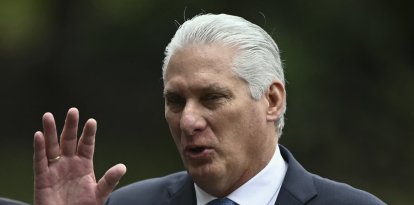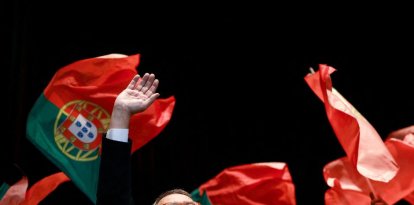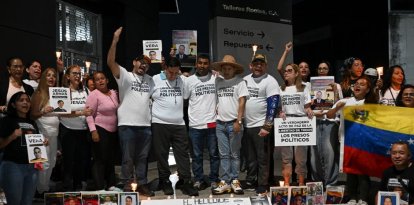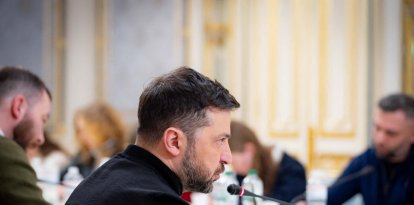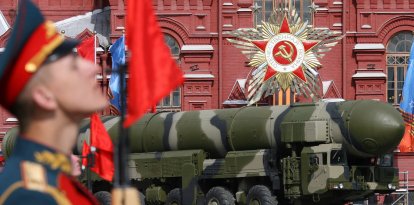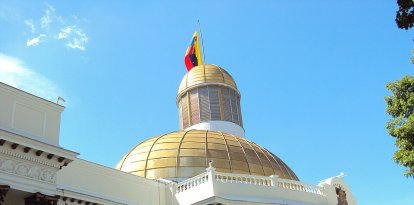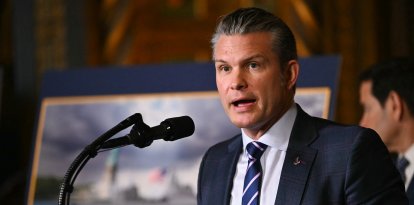Biden makes a pact with the Maduro dictatorship and lifts oil sanctions on Venezuela
The United States has endorsed a strongly criticized electoral agreement reached between the Venezuelan opposition and the Chavista regime this Tuesday in Barbados.

El dictador venezolano, Nicolás Maduro. (Cordon Press)
This Wednesday, the United States Department of the Treasury announced a temporary lifting of sanctions on the oil and gas and gold sectors that weighed on the Nicolás Maduro regime after the Venezuelan dictatorship reached a banal electoral agreement with the Unitary Platform of Venezuela in Barbados.
The Department of Treasury's Undersecretary for Terrorism and Financial Intelligence, Brian E. Nelson, issued a statement informing that the United States "welcomes the signing of an electoral roadmap agreement" and, therefore, selected four general licenses that authorize, among other things, transactions related to the oil and gas sector in Venezuela and it will also allow the extraction of Venezuelan gold by the state company Minerven.
And he warned: "Treasury is prepared to amend or revoke authorizations at any time, should representatives of Maduro fail to follow through on their commitments. All other restrictions the United States imposes on Venezuela remain in place, and we will continue to hold bad actors accountable."
However, according to critics, the easing of US sanctions on the Venezuelan regime appears to have been in exchange for nothing.
"Venezuela delivered its political agreement with the democratic opposition Tuesday and, no surprise, there's little to it. There's no release of political prisoners, no guarantee to restore the right of opposition candidates to run for president next year, and no way to ensure the independence of electoral institutions," reads a harsh editorial from The Wall Street Journal.
The outlet criticized the Biden Administration for its weakness against Maduro and accused the Democratic government of carrying out a foreign policy based on empty promises made by the Venezuelan regime.
"Forgive the reality check, but unpopular dictator Nicolás Maduro isn't about to hold a clean election and politely step aside if he loses. The only thing he understands is sanctions, which is why he's willing to make promises to get them lifted," reads the WSJ editorial.
The media warned that it is no coincidence that the agreement and the lifting of sanctions come days before primary elections are held in Venezuela that have recovered the political morale of Venezuelans. In fact, the media asked the Biden Administration to explicitly support María Corina Machado, who did not participate in the dialogue table with the Venezuelan regime and is the wide favorite to win the next electoral elections organized by the opposition next Sunday, October 22.
Machado, who is currently disqualified by the Maduro regime from participating in general elections in 2024, criticized the agreement reached between the Venezuelan dictatorship and the Unitary Platform.
"The text that was announced of the agreement does not provide certainty to Venezuelans, as it does not specify the specific actions and deadlines that will clear the route to 2024," said Machado, who has not yet commented on the temporary lifting of the sanctions.
Meanwhile, senior officials of the Maduro regime, such as Jorge Rodríguez, head of the delegation of the Venezuelan dictatorship in Barbados, have made it clear in their statements that they are not thinking about giving a truce to the disqualified politicians and would not let them participate in potential general elections, where of course Machado is located.
In fact, in the supposed electoral guarantees, only the green light is given to "the authorization of all presidential candidates, as long as they comply with the requirements established by law."
Following the announcement of the pact between the Biden Administration and the dictatorship of Nicolás Maduro, the Venezuelan regime released five political prisoners. The representative of the Unitary Platform (part of the opposition), Gerardo Blyde, announced the releases. Those released are: journalist Roland Carreño, former deputy Juan Requesens, young Marco Antonio Garcés Carapaica, Eurinel Rincón and Mariana Barreto.
The Secretary of State, Anthony Blinken, confirmed in a statement that the lifting of the sanctions was given with the intention that Maduro complies with the roadmap established in Barbados. He pointed out that the United States expects that before the end of November the regime will advance in two commitments: the release of political prisoners and the establishment of a timetable in which all those who aspire to be president may run for office without conditions.













